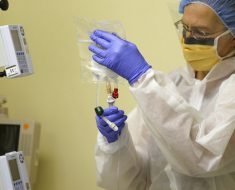In the USA today, more than 123,000 men, women and children are currently waiting for lifesaving organ transplants. Every 10 minutes another name is added to the national organ transplant waiting list. Tragically, there are not enough available organs to meet this demand, which results in an average of 21 deaths each day. Although 90 percent of Americans say they are in support of organ donation, only 30 percent are aware of the steps required to become an organ donor.
In 2013, the total number of organ transplants performed reached 28,953. This included approximately 71,219 multicultural patients around and 1,911 pediatric patients. Anyone can become an organ donor.
“If you are over the age of 18 you can make your wishes known on your driver’s license. Letting family members know of your wishes is also important. If you are under 18, there has to be parental or guardian consent. At the time of death, the donor team then determines if they are medically suitable to donor eyes, tissue or organs for donation,” explains Dr. Velma Scantlebury, is the associate director of the Kidney Transplant Program at Christiana Care, Newark DE.
There are organ and tissue donor registries in all 50 states plus DC and Puerto Rico. If you register before the age of 18, this is considered to be an indication of wish, which at the age of 18 converts to legal documentation of a gift. Donate Life America is a non-profit alliance of national organizations and state teams across the United States committed to increasing organ, eye and tissue donation. The organizations can provide you with information about when and how to register to become an organ donor.

“Registering as a donor – usually done through a DMV transaction – will ensure that your decision is carried out and relieves your family from wondering what you would have wanted – at a time of great stress and sadness,” says Donate Life America’s Managing Director, Melissa Devenny
Which Organs Can you Donate?
Many organs can be donated such as the heart, lungs, liver, kidneys, pancreas, and intestines. Tissues that can be donated include corneas, tissues, heart valves, long bones, connective tissue and blood vessels. It is also important to know that bone marrow and umbilical cord blood can be donated as well as stem cells from the donor. Living donation is also a possibility for kidneys, lobe of a lung, partial liver, pancreas or intestine.
You may be surprised to know that there is no age limit to organ donation. The most important factor is that you are physically healthy. According to Dr. Scantlebury, many organ and tissue donors have been over the age of 80 years. If are considering becoming an organ donor, seek medical advice, don’t un-necessarily rule yourself out because you think you are too old or unhealthy.
The Challenges Facing Organ Donation
Transplantation is a very successful treatment for end-stage organ failure. As a result of the general decline in health of our population, more and more people are in need of transplants to enable them to resume a normal life. According to Melissa Devenny, one of the main challenges to organ donation is the death taboo that exists in our society. In spite of the fact that more than 90 percent of the public supports donation and these individuals say that they would donate if asked, they fail to register their decision. Surprisingly, just over 50 percent of the US adult population is currently registered. When asked why this is, Devenny explains, “because, honestly, they just aren’t planning to die…yet. Unfortunately, the types of deaths that most often result in the possibility of organ donation, such as auto accidents, gunshot wounds, drowning, stroke and other injuries causing massive trauma to the brain, occur with no warning. This can leave the family to make a decision at a time when they are in shock; not a good time to make such an important choice.”
How Does Organ Donation Effect Minorities?
Although organs are not specifically matched according to either race or ethnicity, the need for organ transplants in some ethnic groups is disproportionately high due to a high incidence of diseases such as diabetes and high blood pressure, both of which may ultimately cause the sufferer to require a kidney transplant.
“For example, over 50% of the individuals listed for a kidney transplant are or minority origin. However, less than 35% of patients who received a kidney transplant are of minority origin. If many more minorities are willing to donate, then by increasing the number of donors available will allow more minority patients to get transplanted,” says Dr. Scantlebury.
Organ donation provides a wonderful way for you to support your ethnic community. Although it is possible for a candidate to match a donor from another racial or ethnic group, transplant success rates increase when organs are matched between members of the same ethnic background. If there is a lack of organs donated by multicultural populations, this can contribute to longer wait periods for transplantation.
What are Living Donations?
As a living donor, you may offer a kidney, portion of your pancreas, intestine or liver, or a lobe of your lung to a family member, loved one or a person who is waiting on the national transplant register for an organ from a deceased donor.
Melissa Devenny explains that living donations are becoming increasingly popular because more information is being given out to patients as the time on the waitlist grows. This wait can be as long as 10 years in some states such as New York. Hence, a living donor helps that person avoid the years on the waitlist and offers better outcomes. IN spite raised awareness, over the past five years, the overall national numbers for living organ donation has decreased in minorities.
“Living donation offers people another way to help those in need and we want to ensure that members of the public are aware of this option. Although living donation is most common among family and friends, non-directed donation is possible. What a tremendous opportunity to save or heal the live of another person while you are still living,” says Devenny.
Transplantation is a very successful treatment for end-stage organ failure. As a result of the general decline in health of our population, more and more people are in need of transplants to enable them to resume a normal life. If you have any questions about organ donation contact Donate Life America for more information. Donate Life America focuses exclusively on providing information about donation and referral to all 52 registries.
Resources
http://www.organdonor.gov/index.html
http://womenshealth.gov/publications/our-publications/fact-sheet/organ-donation.html?from=AtoZ
http://optn.transplant.hrsa.gov/
www.DonateLife.net
http://www.womenshealth.northwestern.edu/blog/ultimate-gift-women-and-organ-donation
http://womenshealth.gov/publications/our-publications/fact-sheet/organ-donation.html
http://womensenews.org/story/medicine/141115/organ-gap-more-women-donate-and-they-pay-it
http://www.organdonor.gov/whydonate/minorities.html
http://www.organdonation.nhs.uk/how_to_become_a_donor/living_donation/
Source: Read Full Article





